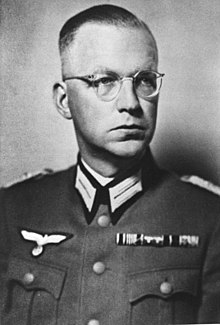Helmuth Groscurth
Helmuth Groscurth (born December 16, 1898 in Lüdenscheid , † April 7, 1943 in Soviet captivity) was an officer in the Wehrmacht and an active resistance fighter against National Socialism .
biography
Helmuth Groscurth was a son of Reinhard Groscurth (1866–1949), who had been pastor prim since 1902. at the Church of Our Dear Women in Bremen . Groscurth grew up in Bremen. He took part in the First World War as a war volunteer from 1916 and was accepted into the Reichswehr after the war . From 1935 to 1938 he was in the Defense Department / Foreign Defense Office in the High Command of the Wehrmacht , in 1939 and 1940 as Head of the Army Department of the General Army Office in the High Command of the Armyin the rank of lieutenant colonel i. G. active. In the spring of 1940 he took part in the campaign in the west as the commander of an infantry battalion .
In 1940 and 1941 he was the first general staff officer of the 295th Infantry Division . In July 1941 he prevented the continuation of a pogrom in Zolochiv , where Ukrainians and soldiers from the SS “Viking” division murdered Jews and Russians. In August 1941 he reported to the Chief of the General Staff of Army Group South, General von Sodenstern , about the events in Byelaya Tserkov . Groscurth initially succeeded in preventing the murder of Jewish orphans by Einsatzgruppe C by bypassing General Field Marshal Walter von Reichenau's protest against the planned form of the murder. Although he made it possible for his superiors to intervene, Army Group South declared that it was not responsible, while Reichenau even approved the murder. At the meeting on August 21, 1941 in the field commandant's office in Bjelaja Zerkow, Groscurth faced a closed rejection of Wehrmacht and SS officers who, like field commandant Riedl, considered the "extermination of Jewish women and children to be urgently necessary" or, like the SS Standartenführer and leader of SS-Sonderkommando 4a Paul Blobel threatened that "commanders who stopped the measures [should] take command of this [execution] force themselves". Groscurth was then reprimanded. In 1943 Groscurth came as Colonel i. G. and Chief of the General Staff of the XI. Army Corps of the 6th Army in the Battle of Stalingrad in Soviet captivity, in which he died shortly afterwards.
After the war, details of the September conspiracy became known through his diary . Together with Hasso von Etzdorf and Erich Kordt , Groscurth wrote the secret memorandum Das threatenende Unheil in October 1939 , a request to the military leadership to "overthrow Hitler" in good time, since the usual "arguments, protests or resignation declarations of the military leadership alone [...] experience has shown that neither a giving in nor giving in [Hitler's, GU ] would '[...] ”.
literature
- Helmuth Groscurth: Diaries of an Abwehr Officer 1938–1940. With further documents on the military opposition to Hitler. Edited by Helmut Krausnick and Harold C. Deutsch (= sources and representations on contemporary history; Vol. 19). DVA , Stuttgart 1970.
- Helmuth Groscurth [Jr.]: Christian, patriot, soldier. From the origin and life of a German officer. In: Military History. Neue Episode 1, 1991, p. 15 ff. ISSN 0932-0458 , ISSN 0940-4163 .
Web links
- Christian Streit: General Staff Officer against the atrocities . In: Süddeutsche Zeitung of December 9, 2017.
Individual evidence
- ↑ Christian Streit: Against the horrors. How General Staff Officer Helmuth Groscurth resisted the murder in the Soviet Union . In: Süddeutsche Zeitung of December 9, 2017, p. 55.
- ↑ Groscurth's report of August 21, 1941 for the Chief of the General Staff of Army Group South, General Georg von Sodenstern, on the events in Belaya Zerkow on August 20, 1941. In: curse script.
- ↑ Bernd Boll / Hans Safrian : On the way to Stalingrad. The 6th Army in 1941/42 . In: Hannes Heer / Klaus Naumann (ed.): War of Extermination: Crimes of the Wehrmacht 1941 to 1944 . Hamburger Edition , Hamburg, 2nd edition 1995, ISBN 3-930908-04-2 , pp. 260-296, here pp. 275-278 (quotation, p. 277); Timm C. Richter: Scope of action using the example of the 6th Army . In: Christian Hartmann , Johannes Hürter u. Ulrike Jureit (Ed.): Crimes of the Wehrmacht. Beck, Munich 2005, ISBN 3-406-52802-3 , pp. 60-68, here p. 64; Hans Mommsen : Alternative to Hitler. Studies on the history of the German resistance. Beck, Munich 2000, ISBN 3-406-45913-7 , p. 402. Reprint of Groscurth's report to von Reichenau in VEJ 7/62.
- ↑ Gerd R. Ueberschär : On the way to July 20, 1944 . Federal Agency for Civic Education, April 9, 2005; the abbreviation “GU” stands for the author Gerd R. Ueberschär.
| personal data | |
|---|---|
| SURNAME | Groscurth, Helmuth |
| BRIEF DESCRIPTION | German officer in the Wehrmacht and active resistance fighter against National Socialism |
| DATE OF BIRTH | December 16, 1898 |
| PLACE OF BIRTH | Ludenscheid |
| DATE OF DEATH | April 7, 1943 |
| Place of death | Soviet Union |
